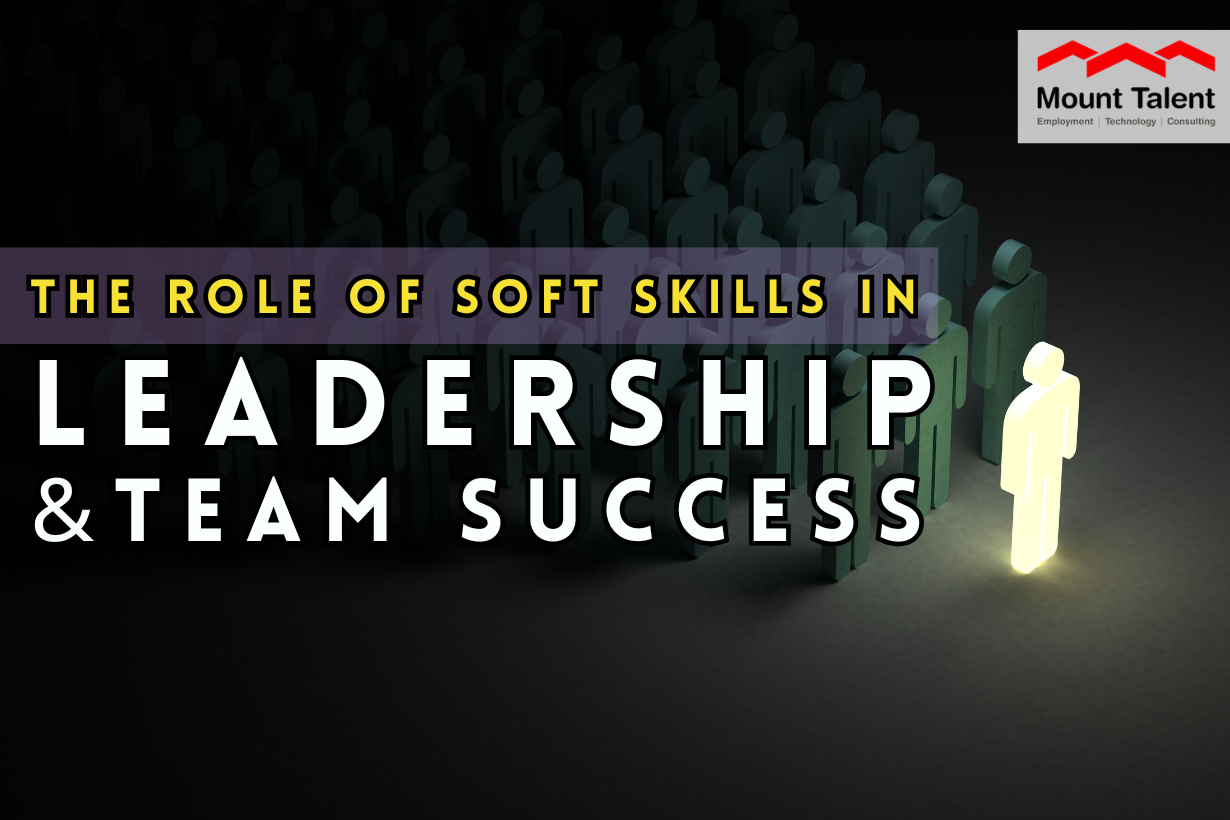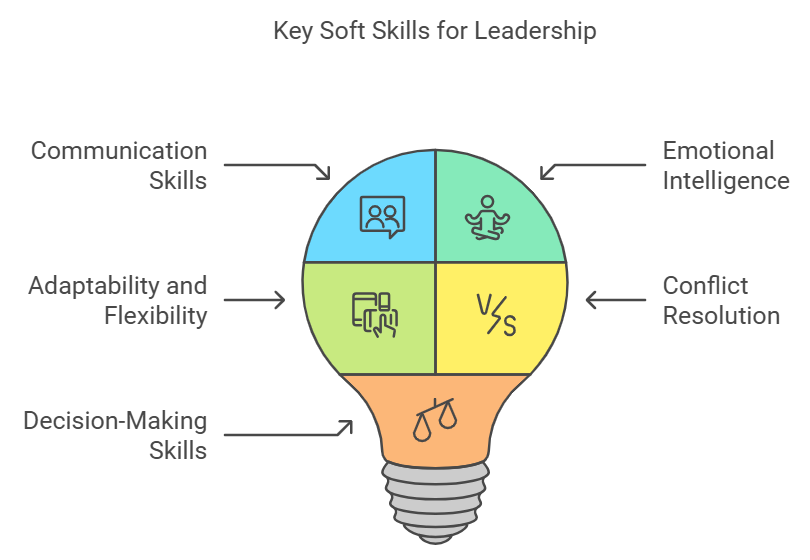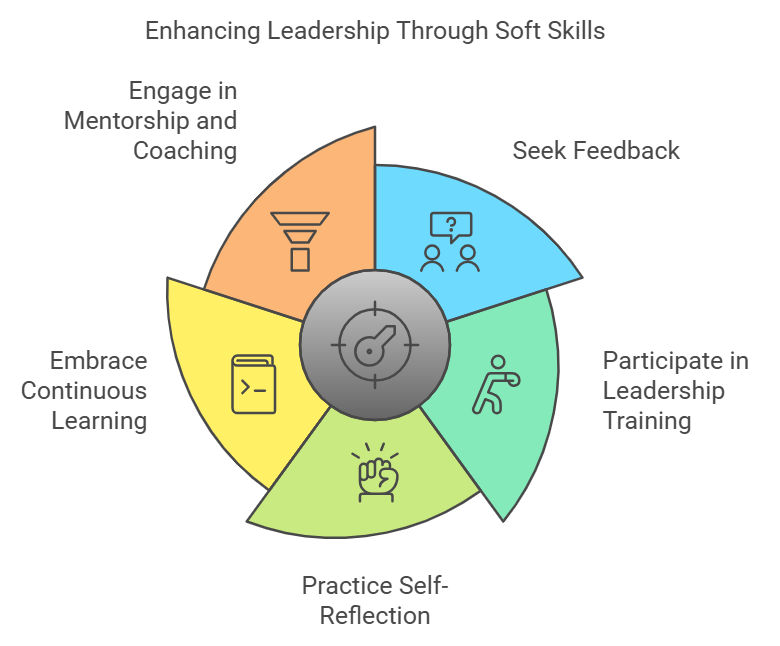
The Role of Soft Skills in Leadership and Team Success
- by Mayank Thapa
It would seem unreasonable in today’s constantly changing organizational environment, to rely solely on professional competence to succeed in a leadership position. Leadership qualities are necessary for the approver to lead the requisite subordinates, support proper work setting, and accomplish organizational goals. Holistically, soft skills development such as communication skills, interpersonal skills, flexibility, and Conflict management skills are very essential to encourage a team as well as realizing sustainable results. Here, we aim to discuss the importance of soft skills in leaders and executive management, how they impact team performance and approaches managers/leaders can take to achieve leadership skills development to strengthen such essential assets.
Understanding Soft Skills and Their Relevance for Leaders
Soft skills for leaders are therefore personal attributes and emotional character that enable a person or social beings to coexist with others. These skills are critical to leaders as they fill the space between technical know-how and the delivery of management tasks. While hard skills refer to the knowledge that leaders have, then the soft skills for leaders refer to how leaders engage, communicate, and influence others in an organization. Beneath the soft skills, leaders will effectively understand and be able to influence their teams by solving conflicts and encouraging the team.
Key Soft Skills for Leaders:
- Communication: Both the communication skills of writing effectively to put down ideas in simple and concise manner and strong listening skills.
- Empathy: Working from self and others’ emotions, values, beliefs, and opinions.
- Adaptability: The ability of an organization, management, or individual to change and adapt in a positive way.
- Conflict Resolution: Skill in managing and resolving disputes constructively.
- Emotional Intelligence: Monitoring one’s own feelings and knowing how others feel.
The Importance of Soft Skills in Leadership
Thus though soft skills for leaders help to enhance an individual leader’s effectiveness they are far more important as tools to build and manage teams for improved performance in the face of adversity. Soft skills are interpersonal and people management skills where effective and efficient leaders of an organization promote effective working relationships, transparent communications, and commitment in an organization. It fosters high levels of organizational citizenship behavior that improves job satisfaction, reduces turnover, and increases performance.
Why Soft Skills Matter in Leadership
- Enhancing Communication: Administrators are able to utilize their soft skills in an area where they must express clarity and foster free-wheeling debate. It reduces conflict of understanding, creates consistency of purpose, and fosters the morale of a team.
- Building Trust: When the coworkers recognize their leader as empathetic and emotionally intelligent, then the coworkers feel that their leader cares for them this increases trust.
- Promoting Collaboration: Soft skills can help the leaders manage the employees, and make the atmosphere congenial for the idea generation or criticism.
- Encouraging Employee Development: Managers who appreciate the importance of soft skills promote the growth of these skills within their personnel to the advantage of the person in question as well as the company.
- Inspiring Innovation: The last with a characteristic of flexibility and openness of minds and organizations to embrace innovation in ways that enable teams to experiment with ideas as well as define appropriate strategies for addressing change.
Essential Soft Skills for Leadership Success
Given the fact that leaders of high-performing teams need to possess certain interpersonal competencies, it became apparent that soft skills for leaders are indeed something to be developed. Those are some of the soft skills that have a significant impact on the leadership process:

1. Communication Skills
For managers to lead their subordinates they need to be good communicators and be able to provide the necessary information when needed as well as encourage individuals or groups. When communication is clear there are few misunderstandings, common goals are set, and everyone is more open. The key distinguishing element of leadership efficiency enhancement training is the focus on the communication aspects.
2. Emotional Intelligence
Emotional intelligence means the ability of a manager to regulate one’s emotions and being able to recognize the moods of others. This skill is crucial when it comes to promoting positive rumors in the workplace, especially at trying moments. An important aspect of the definition of individuals having highly developed emotional intelligence is the ability to identify the signs that other people give off and reciprocate with solicitous feelings. Employees, with their bosses, in particular, can have deeper connections with their stewards.
3. Adaptability and Flexibility
As documented earlier, there is tremendous volatility in the modern workplace, and any manager must adapt to these uncertainties effectively. Flexibility enables the leaders to overcome various hurdles, it challenges the employees as well as makes them appreciate changes.
4. Conflict Resolution
In every team, there are always problems and issues that arise and are likely to cause conflict but when leaders have good conflict-solving skills then they are well in a position to develop conflicts into disputes. Since leaders assist in mitigating conflicts, the team spirit is retained since no conflict is allowed to worsen.
5. Decision-Making Skills
In other words, decision-making fully involves rationality and feelings. He or she has to analyze information within the framework of the organization and think about people, balancing between the facts and organizational values. It is very important in order not to lose the team’s confidence in the leader and his decisions.
The Impact of Soft Skills on Team Success
Several examples show the thorough correlation of soft skills to leadership by identifying their role for the team. Soft skills will enable the leaders to foster the right organizational culture that will enable the members of the team to work hard. Some of the ways in which soft skills for leaders influence team performance are;
1. Increased Productivity
When leaders communicate they ensure the teams perform well, and understand what is expected of them and when they get feedback it is constructive. Everyone needs to be managed as a team hence soft skills create a focused and goal-directed environment leading to high productivity.
2. Improved Employee Engagement
When employees are engaged they are most likely to be committed to both the work and organization they are doing. Employers who incorporate soft skills that require honing leadership skills help employees gain a feeling of identification that makes them more interested in their work.
3. Enhanced Problem-Solving Abilities
Culture suggests that teams of employees who work under considerate managers who are receptive are more likely to resolve issues in a creative manner. Team members can feel more comfortable when the managers promote the ideas from all the workers, which will create the base for developing ideas.
4. Stronger Team Cohesion
Emotional intelligence and conflict resolution skills are some of the soft skills that foster a collective team. Managers who successfully manage interpersonal conflict encourage a healthy workplace environment bringing out unity in the team.
How Leaders Can Develop Soft Skills
Leadership skills development can be attributed to the improvement of self-knowledge, training, and experience. Here are some strategies leaders can use to enhance their soft skills:

1. Seek Feedback
This way, leaders can also seek feedback from subordinates, peers, and superiors to get to know what is considered strengths and what is perceived as weaknesses. Constructive criticism gives one useful knowledge and aids in development.
2. Participate in Leadership Training
Most leadership skills development programs are designed as soft skills training. These programs involve the management of skills such as communication, conflict-solving, and emotional intelligence through activities such as workshops, role-play, and coaching.
3. Practice Self-Reflection
Reflection helps leaders to think about what they do together with the way they think about things and possibly how they feel about things. Leaders are able to make deliberate efforts to modify their behavior based on the motivation and emotions that were discovered.
4. Embrace Continuous Learning
It can therefore be seen that soft skills for leaders are developed over the years. It’s important for leaders to read books, attend courses, or use resources related to leadership to get ideas about how to manage people differently.
5. Engage in Mentorship and Coaching
The training in particular should enable leaders to get advice on how to address the challenges as well as to polish soft skills. Coaches and mentors can provide information matching the leader’s development needs in certain areas.
The Future of Leadership on Emphasizing Soft Skills
soft skills have been insisted on since it is clear that workplaces globally are getting more diverse and involve collaboration. Through leadership skills development, leaders are well-positioned to build a diverse, flexible, and sustainable workforce. It is not just a trend to focus arms on soft skills but a good strategy that matches the forces of the workforce and the ability to attain sustainable results for organizations.
Conclusion
Integrating soft skills for leaders into the very core of leadership becomes paramount to the creation of potent and efficient teaming. When organizational leaders recognize soft skills’ significance and direct efforts toward leadership skills improvement, people will be encouraged to collaborate, team morale will be boosted, and organizational performance will thus be optimized. Moreover, compliance with empathy, communication, or flexibility lets leaders bond with the collective team, enhancing proper development individually as well as in a team. To learn more about this or for other leadership solutions, please visit mounttalent.com. The site offers unique career profiles and tools for leadership to enhance one’s professional path.
Frequently Asked Questions
- Why are soft skills important for leaders?
Answer- Appropriate personality skills for leaders are important since they bring about trust, communication, and ever-effective team behavior all of which are significant in leadership.
- What are some essential soft skills for leadership success?
Answer- Soft skills in question are communication skills, anger management, flexibility, conflict-solving, and problem-solving.
- How can leaders improve their soft skills?
Answer- There is an opportunity for leaders to develop through feedback, formal training, critical thinking, professional development, and apprenticeship.
It would seem unreasonable in today’s constantly changing organizational environment, to rely solely on professional competence to succeed in a…
